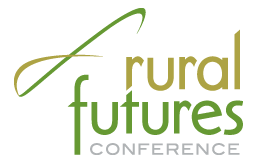
As first steps go, participants agreed, the inaugural University of Nebraska Rural Futures Conference was a big one, helping to set the stage for creation of the new Rural Futures Institute.
But the next steps are fraught with huge challenges, speakers said Thursday afternoon as the three-day conference ended. The conference drew about 450 people; its aim was to help set the agenda for the institute, which is expected to be in operation by the fall.
The institute is being established to build partnerships between the university and rural communities in an effort to help rural areas be resilient, sustainable and innovative.
“We already know how to do this,” said
llen Weissinger, senior vice chancellor of academic affairs at UNL. “We have a 140-year track record” as a land-grant university in helping agriculture prosper and innovate.
“We just need to take that model and apply it to even more areas of rural life,” Weissinger added.
After a morning of informal small-group conversations that surfaced hundreds of ideas, large and small, for the institute, afternoon discussion featured both excitement and cautions about the work ahead.
Several people observed that the conference was rather insular, dominated by academics from UNL and other universities, and the institute must move beyond to be successful. Mary Kay Quinlan, associate professor of journalism at UNL, said some suggested the institute consider a youth advisory board and encouraged it not to leave out community, state and tribal colleges.
The institute will challenge the four campuses of the NU system to collaborate and cooperate in ways they haven’t before, said Roni Reiter-Palmon, professor of psychology at the University of Nebraska at Omaha. “This system, this organization is not designed for interdisciplinary work,” she said.
Another closing-panel participant, David Procter, director of engagement and community development at Kansas State University, warned against the “danger of overpromising what can be done by the institute.”
And Matt Rezac, director of rural community partnerships at the Omaha-based Sherwood Foundation, cautioned the university against creating a new bureaucracy, what he called “another corridor of mystery for people on the outside, another layer that people don’t quite understand.”
Weissinger said the institute’s work won’t be universally popular and not everything it does will succeed.
“If we do our jobs well, we will explore ideas that will be discomforting,” she said. “Given the scope and breadth and complexity, we’re going to have to be patient while we fail.”
But much of Thursday’s discussion focused on the excitement and potential surrounding the Rural Futures Institute.
“There’s an urgency to get this done. There’s a sense of hope,” said Esmeralda Cruz, an extension assistant from Purdue University. “People really believe something can come out of this. It’s not just one more conference you go to and nothing gets done.”
Weissinger said UNL faculty are primed to lead such an effort because “by and large, they find meaning in the fact that they work in Nebraska.”
Sam Cordes, a former UNL rural sociologist who’s now retired from Purdue, added “We ultimately have to see ourselves as public servants ... We do have a responsibility to do this type of work.”
Cordes, a senior advisor for the institute, noted he’s been involving in rural development for 40 years. “I have never seen anything considered that’s even remotely close to what’s being considered here.”
“This discussion needed to happen,” said Ronnie Green, NU vice president for agriculture and natural resources and Harlan vice chancellor of the university’s Institute of Agriculture and Natural Resources. “We’re going to learn a lot from what we heard from you.”
Other stories about the Rural Futures Conference can be found at: http://bit.ly/KFYy0N and http://bit.ly/KRhMey.
-- Dan Moser